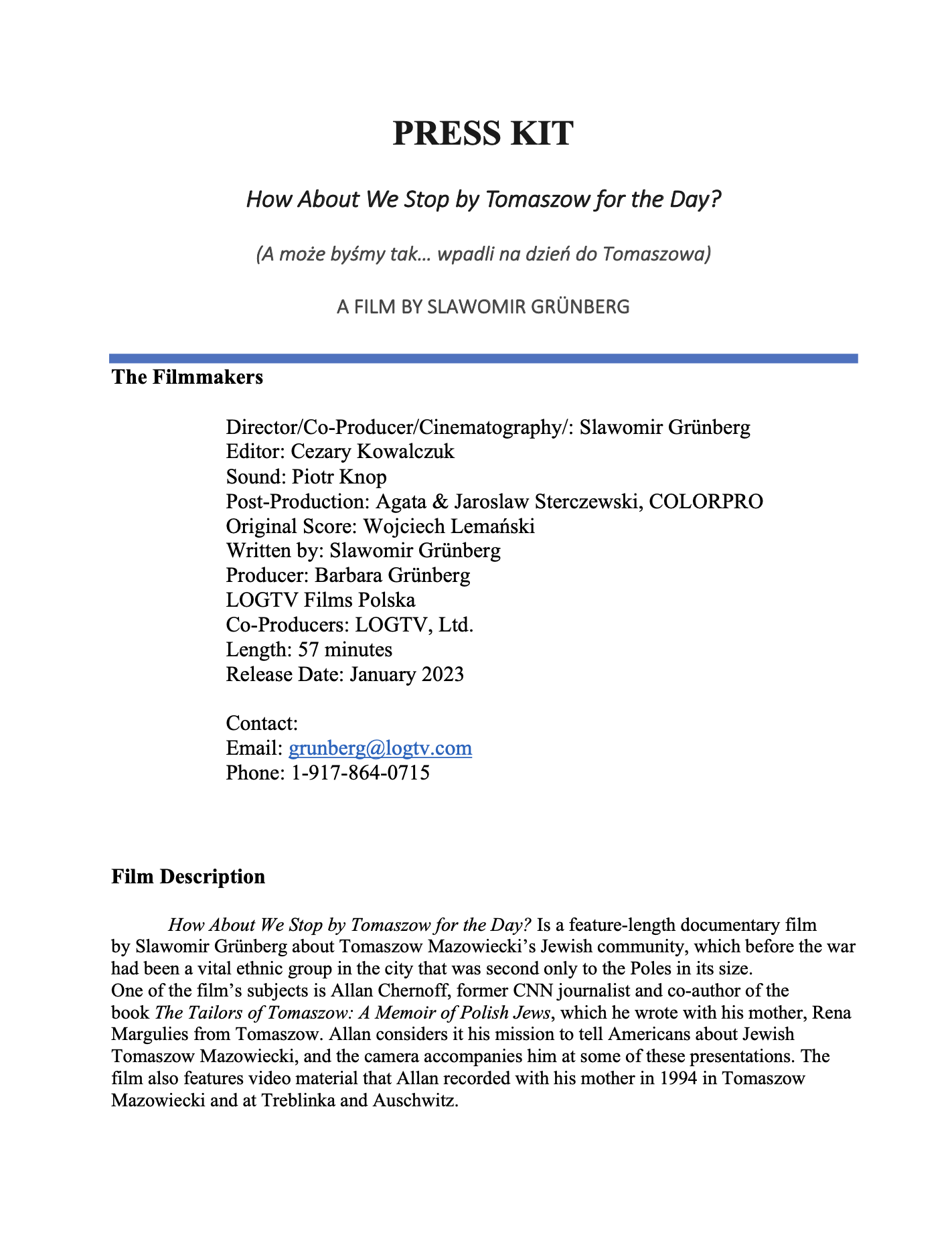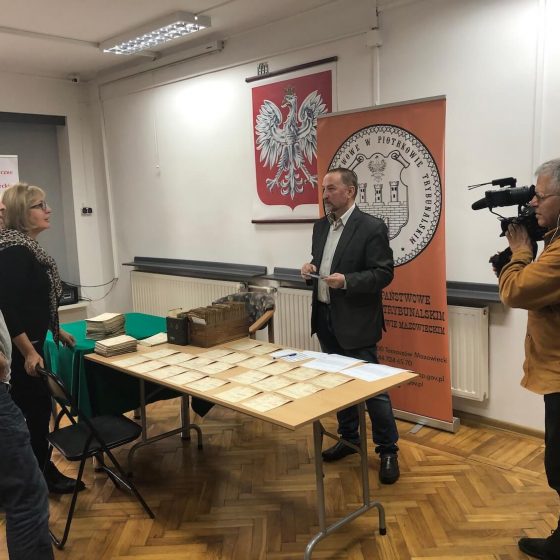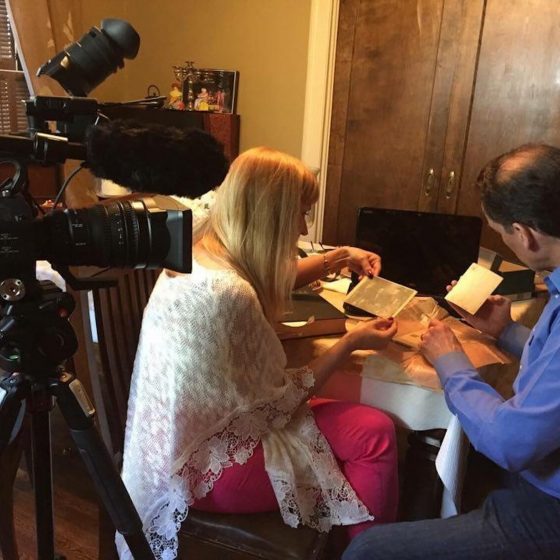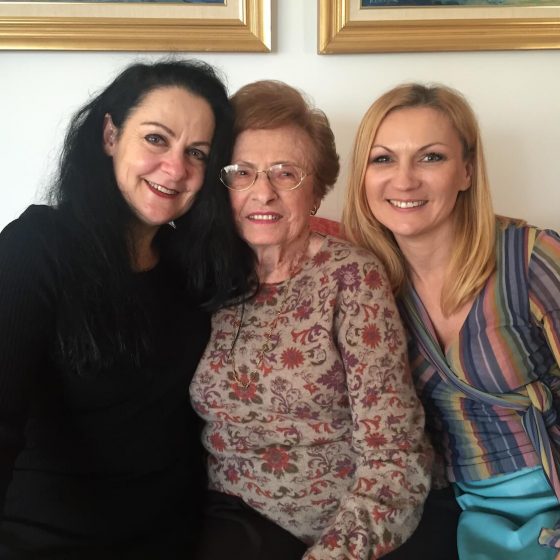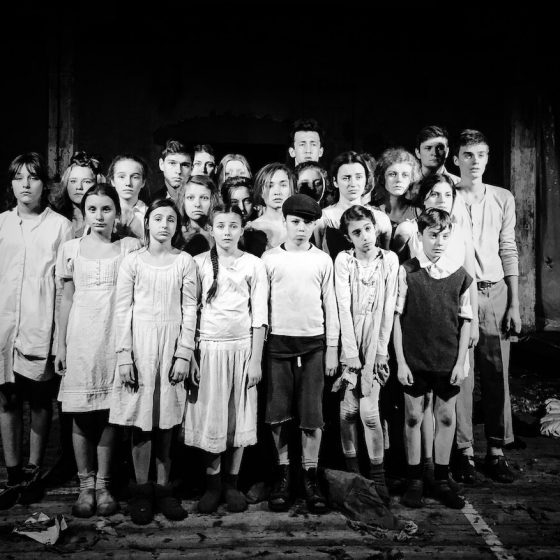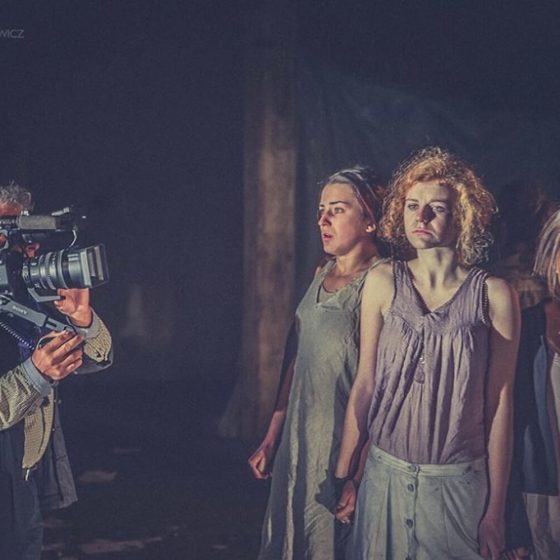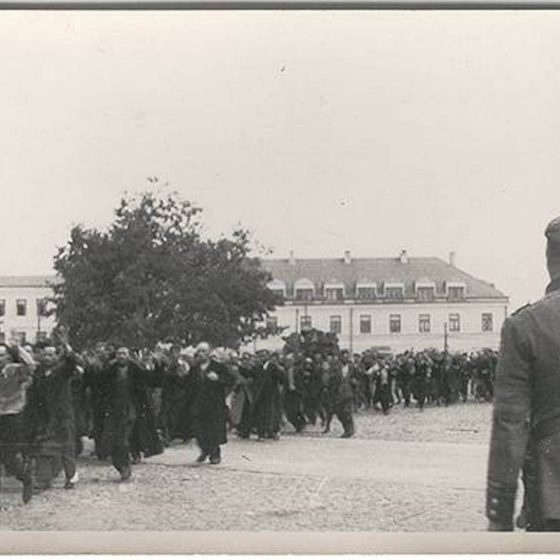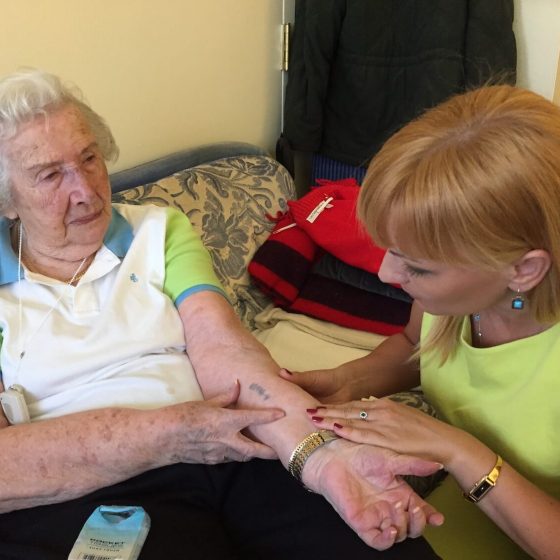How About We Stop by Tomaszow for the Day? (A może byśmy tak … wpadli na dzień do Tomaszowa)
How About We Stop by Tomaszow for the Day? is a feature-length documentary film by Slawomir Grünberg about Tomaszow Mazowiecki’s Jewish community, which before the war had been a vital ethnic group in the city that was second only to the Poles in its size. Read more below.
ABOUT FILM
ABOUT FILM - IN POLISH
CREDITS
ALLAN CHERNOFF'S BIO
SCREENINGS AND AWARDS
PRESS KIT
ABOUT FILM
How About We Stop by Tomaszow for the Day? is a feature-length documentary film by Slawomir Grünberg about Tomaszow Mazowiecki’s Jewish community, which before the war had been a vital ethnic group in the city that was second only to the Poles in its size. One of the film’s subjects is Allan Chernoff, former CNN journalist and co-author of the book The Tailors of Tomaszow: A Memoir of Polish Jews, which he wrote with his mother, Rena Margulies from Tomaszow. Allan considers it his mission to tell Americans about Jewish Tomaszow Mazowiecki, and the camera accompanies him at some of these presentations. The film also features video material that Allan recorded with his mother in 1994 in Tomaszow Mazowiecki and at Treblinka and Auschwitz.
The film’s other subjects include the world renowned pianist, Sarah Grunstein (the daughter of Chana Bornstein from Tomaszow), who travels between Sydney and New York , and two siblings – Ewa Korulska, who lives in Switzerland and her brother, computer programmer Daniel Wencel from California – who in their incredibly revelatory journey and search of their family roots are accompanied by Professor Krzysztof Tomasz Witczak. Allan, together with his mother Rena, as well as Ewa and Daniel all “stopped by” Tomaszow for a day in order to confront the stories they heard from their parents and grandparents with today’s reality.
With great sadness they realize that there are no signs or memorials commemorating the Jewish presence in the city marking such sites as the synagogue, mikvah, etc. For them, the film represents hope that the memory of their families as well as the entirety of Tomaszow Mazowiecki’s Jewish community will not be lost. Other incredibly important subjects of the film are former Jewish inhabitants of Tomaszow Mazowiecki who survived the holocaust and today live in various corners of the earth. People like Sally Maierowitz or Zlatka Warzecha. The women tell us how they remember Tomaszow from before the war as children as well as immediately after the war. Zlatka, who visited Tomaszow in the 90s, prefers to see at it on online maps with her daughter.
The film has a personal thread as well – about why a Pole from Tomaszow Mazowiecki, Barbara Grünberg, who conceived the film and is its de facto narrator, in the face of all adversities still decided to make the film with her husband Sławomir Grünberg. Seven years later, in an intimate conversation with the film’s director, she answers the questions: Who would be interested in the Jewish history of the city? Why did she want this film to be made? And why is the film so important to her? Barbara also recalls the reaction of a friend to her departure from her hometown in 2016 after marrying Sławomir Grünberg, a Jew.
In 2015, Slawomir Grünberg also “stopped by” Tomaszow for a day to see a theatrical performance of the play Letters from the Ghetto, which was produced by Barbara, who was director of the local cultural center at-the-time. The play starred youth from Karina Gora’s “Trzcina” Theater with original set design in a building located within the former ghetto, where workshops had been operated by slave laborers. Scenes from the play, in which the roles of Jewish slave laborers were performed by youth from Tomaszow schools, have been integrated into the film How About We Stop by Tomaszow for the Day?
An incredibly important scene in the film is where Artur Gogel of Lodz, who spends his life in search of traces of former Jewish communities throughout Poland, finds a mark left by a mezuzah – the last trace of Tomaszow’s Jews. Young afficionados from MI POLIN, Helena Czarnek and Aleksander Prugar, make a mold of it in order to later cast it in bronze. Thanks to an expert on the Tomaszow region, Marian Fronczkowski, and curator of the Tomaszow Mazowiecki Museum, Daniel Warzocha, as well as the translator of the Memorial Book of Tomaszow’s Jewish Community, Anna Ciałowicz, the audience has a chance to take part in a stroll along the old Jewish streets of Tomaszow. It is worth noting that Stefan Brajter’s rephotographs prepared for the purposes of the film play a major role in it. Thanks to them, the audience is able to travel nearly a century into the past. The film’s score was composed by Wojciech Lemański, who also authored the score to Sławomir Grünberg’s film Still Life in Lodz.
Duration 67 minutes
ABOUT FILM - IN POLISH
„A może byśmy tak… wpadli na dzień do Tomaszowa” to pełnometrażowy film dokumentalny o społeczności żydowskiej Tomaszowa Mazowieckiego, która przed wojną stanowiła po Polakach największą i najbardziej witalną grupę etniczną miasta.
Jednym z bohaterów jest Allan Chernoff, były dziennikarz CNN, współautor książki „Krawcy z Tomaszowa: pamięć o polskich Żydach”, którą napisał wspólnie ze swoją mamą, tomaszowianką Reną Margulies. Allan od lat poczytuje za swoją misję opowiadanie Amerykanom o żydowskim Tomaszowie Mazowieckim, a kamera towarzyszyła mu w kilku takich prezentacjach. W filmie zobaczymy również materiał video, który Allan nakręcił ze swoją mamą podczas wizyty w Tomaszowie Maz. w 1994 roku.
Pozostali bohaterowie filmu to: światowej sławy pianistka, przemieszczająca się pomiędzy Sydney i Nowym Jorkiem – Sarah Grunstein (córka tomaszowianki Chany Borensztajn) oraz rodzeństwo – Ewa Korulska, mieszkająca na co dzień w Szwajcarii i jej brat programista komputerowy Daniel Wencel z Kalifornii, którzy szukają rodzinnych korzeni, a towarzyszy im w tej niezwykle odkrywczej podróży profesor Krzysztof Tomasz Witczak.
Allan, Ewa i Daniel „wpadli” na dzień do Tomaszowa, aby skonfrontować zasłyszane od rodziców i dziadków opowieści z dzisiejszą rzeczywistością.
Ze smutkiem przekonują się, że nie ma w mieście śladów upamiętnienia miejsc pamięci, tj. synagogi, mykwy itp. Film jest dla nich nadzieją na to, że nie zaginie pamięć po ich rodzinach i całej żydowskiej społeczności Tomaszowa Maz.
Bardzo ważnymi bohaterami filmu są żydowscy mieszkańcy Tomaszowa Maz., którzy przeżyli Holokaust, żyją po dziś dzień w różnych zakątkach świata, tak jak Sally Maierowitz czy Zlatka Warzecha. Kobiety opowiadają, jak zapamiętały Tomaszów.
Film ma również wątek osobisty, traktujący o tym, jak to Polka Barbara Grünberg, pomysłodawczyni filmu i niejako jego narratorka, wspomina swój wyjazd z Tomaszowa Mazowieckiego w kontekście wyjścia za mąż za Żyda, Sławomira Grünberga.
W 2015 roku Sławomir Grünberg również „wpadł” na dzień do Tomaszowa, aby obejrzeć wyjątkowy spektakl teatralny „Listy z getta”, wyprodukowany przez Barbarę jako ówczesną dyrektorkę domu kultury, zagrany przez młodzież z Teatru „Trzcina” Kariny Góry i wystawiony w oryginalnej scenografii, w budynku mieszczącym się na terenie getta, gdzie odbywały się warsztaty przymusowej pracy.
Bardzo ważną sceną w filmie jest moment, kiedy łodzianin Artur Gogel, na co dzień szukający w całej Polsce śladów po społeczności żydowskiej, odnajduje ślad po mezuzie – ostatni istniejący ślad po tomaszowskich Żydach. Młodzi pasjonaci z MI POLIN, Helena Czernek i Aleksander Prugar pobierają jego odcisk, aby przygotować odlew.
Dzięki tomaszowskiemu regionaliście – Marianowi Fronczkowskiemu, kustoszowi Muzeum w Tomaszowie Maz. – dr Danielowi Warzocha oraz tłumaczce „Księgi pamięci gminy żydowskiej w Tomaszowie Mazowieckim” – Annie Ciałowicz widz ma okazję uczestniczyć w spacerze po dawnych żydowskich ulicach Tomaszowa.
Warto podkreślić dużą rolę re-fotografii przygotowanych na potrzeby filmu przez Stefana Brajtera. Dzięki tym kolażom widz może niejako przenieść się o prawie jeden wiek wcześniej.
Treści filmu dopełnia wyjątkowa muzyka skomponowana specjalnie na potrzeby filmu przez kompozytora Wojciecha Lemańskiego.
CREDITS
Director/Co-Producer/Cinematography/:
Slawomir Grünberg
Editor:
Cezary Kowalczuk
Sound:
Piotr Knop
Post-Production:
Agata & Jaroslaw Sterczewski, COLORPRO
Original Score:
Wojciech Lemański
Written by:
Slawomir Grünberg
Producer:
Barbara Grünberg
LOGTV Films Polska
Co-Producers: LOGTV, Ltd.
ALLAN CHERNOFF'S BIO
Former CNN and CNBC senior correspondent Allan Chernoff is the author of The Tailors of Tomaszow, which was written with his mother Rena Margulies Chernoff who was one of the youngest survivors of the Holocaust. Through the eyes of child and teenage survivors, The Tailors of Tomaszow delivers a rare, unvarnished, and memorable account of life in Rena’s hometown, Tomaszow-Mazowiecki, Poland, before, during, and after World War II.
During a three-decade career in journalism, Allan Chernoff won six best reporting awards from the Society of Professional Journalists. His reporting was also recognized with multiple National Headliner Awards and New York Festival Awards, and he was a member of reporting teams honored with DuPont and Peabody Awards.
His writing has appeared in numerous publications, including The New York Times, The Wall Street Journal, Los Angeles Times, Financial Times, Fortune, Money, Newsweek, The Guardian, and The Forward. He is CEO of Chernoff Communications, which provides writing, video production, and media strategy services to corporate and not-for-profit organizations. Mr. Chernoff is a graduate of Brown University. He served as an interviewer for the Survivors of the Shoah Visual History Project and is a speaker for the Heritage Testimonies program of the Museum of Jewish Heritage.
SCREENINGS AND AWARDS
Premiera odbędzie się 28 czerwca 2023 r. w Krakowie na 32. Festiwalu Kultury Żydowskiej.

